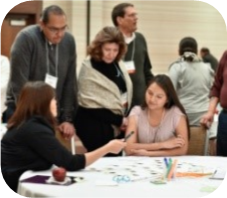By Mike Splaine, Splaine Consulting and Jolie Crowder
July 18, 2021
Featuring:
Dr. Tassy Parker, University of New Mexico, Center for Native American Health
Ryan Eagle, North Dakota State University, American Indian Public Health Resource Center

“Tribes inherently operate their own public health departments’ because we know, at a deep level, that it is hard to describe to outsiders, that the health of each of us is intertwined with the health of all of us and the environment in which we live,” This, according to Dr. Tassy Parker, an enrolled member of the Seneca Nation (Beaver clan) and tenured Associate Professor of Family and Community Medicine at the University of New Mexico (UNM).
During recent meetings of the IA2 Brain Health Advisory Group, breakout group discussions focused on identifying entities within American Indian and Alaska Native communities that contribute to the delivery of public health services for people living with Alzheimer’s or related dementias (ADRD) and their families. Groups created complicated visual diagrams of interconnections and disconnections, ranging from tribal leadership to judicial systems.
Recognizing that many tribal health organizations have few persons formally trained in public health or assigned public health duties, capacity challenges exist to using public health approaches.
Yet, “It may not matter who wields the tools of public health as much as that they are used,” according to Ryan Eagle, Research Project Manager at the American Indian Public Health Resource Center at North Dakota State University. Eagle is an enrolled member of the Three Affiliated Tribes of the Fort Berthold Indian Reservation in North Dakota.
A core public health approach[i] involves using data as the basis of planning and demonstrating impact (surveillance and monitoring). Unfortunately, little published data exists about dementia and caregiving in Indian country.
In a recent interview, Eagle said, “Tribes do have the data they need to initiate public health approaches, but it may be siloed; it may be in the form of wisdom and memory of our Elders; and it may be scattered–but it can be brought together if tribal leaders are engaged and asked, not told.”
 As sovereign nations, tribes own their data. Current best practices call for a Data Use Agreement or some other formal mechanism that governs access, permissions, and release of tribal data to outside organizations.
As sovereign nations, tribes own their data. Current best practices call for a Data Use Agreement or some other formal mechanism that governs access, permissions, and release of tribal data to outside organizations.
Another hallmark of a public health approach involving data is the need to assess results/ evaluate the success of program interventions. Tribes should plan for how to assess results, together with community key players, before starting the work. “Taking Tassy’s words to heart means the community needs to have a strong voice in identifying what success of a program or activity looks like for them. Many pre-packaged chronic disease programs can look like they are failures when in fact, they are making positive change,” offered Eagle.
Indigenous principles of evaluation and community-based principles of research (CBPR) have been met with rising interest in the U.S. The Centers for Disease Control and Prevention’s (CDC’s) Good Health and Wellness in Indian Country (GHWIC) program worked to incorporate an indigenous approach to evaluation[ii]. A big focus of GHWIC was taking a holistic approach to health promotion and chronic disease, addressing a variety of chronic issues with culturally appropriate strategies.
Two countries, Australia and Canada, remain at the forefront of acknowledging and meaningfully embedding these practices and principles. At the local level, Parker’s Center for Native American Health at UNM offers a CBPR Institute and an annual Community Health Assessment Institute for tribal communities.
The closer you look, you will find the tools and traditions of public health align well with tribal culture and helping to address dementia and caregiving issues.
For more information, request assistance from IA2 about accessing brain health resources, or view these additional resources:
- Urban Indian Health Institute: Report of best practices for American Indian and Alaska Native Data Collection
- The National Collaborating Centre for Aboriginal Health: Indigenous Approaches to Program Evaluation
- The Great Plains Tribal Chairmen’s Health Board: Indigenous Evaluation Toolkit
- Alzheimer’s Association, CDC, and Emory Centers for Training and Technical Assistance: A Public Health Approach to Alzheimer’s and Other Dementias
[i] See https://www.cdc.gov/aging/aginginfo/pdfs/A-Public-Health-Approach-To-Alzheimers.pdf
